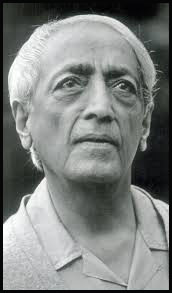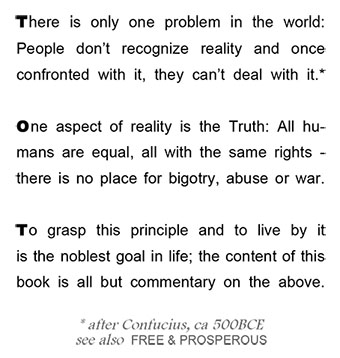522 Krishnamurti wanted a total revolution
Jiddu Krishnamurti is unequivocal about the condition of man: We are unkind to one another; as a remedy he advocates a total revolution of the mind. This is a subject close to me; study of the mind and what it manifests in life ... our actions. It's a BIG subject … I have essays on MIND I and MIND II in my book with no title, instead three definitions for the term en.light.en.ment

Krishnamurti (from The Awakening of Intelligence):
"As one observes the appalling conditions of poverty and the ugliness of man's relationship to man ... it becomes obvious that there must be a total revolution. A different kind of culture must come into being. The old culture is almost dead, yet we are clinging to it. The young revolt against it, but unfortunately have not found a way, or a means, of transforming the essential quality of the human being, which is the mind. Unless there is a deep psychological revolution, mere reformation on the periphery will have little effect. This psychological revolution is possible through meditation."
-----------------------------------
Feedback:
Is this a “revolution” through meditation, education, dialogue, enlightenment … or at the point of a gun? Given you are a pacifist, I presume the former.
However, “enlightenment” might mean the acceptance of reality rather than the acceptance of a utopian and totally impossible solution ...
Here we are at a point where the term 'reality' requires definition (not interpretation); and that issue is at the heart of my enquiries ... I allude to it in the intro to my book:

So what is reality? In the context of this blog let's look at Krishnamurti's angle. In his book Freedom from the Known he arrives at the conclusion that before we can grasp reality we have to rid ourselves from what we know ... this is a shocking concept: Disregard all we've read, seen and listened to, all we've learnt? Start from scratch? Yep, that is what freedom from the known entails. Only then can we look at the world without prejudices, biases ... indeed without opinions and beliefs.
We arrive at the state of discarding the known in meditation. Meditation (true meditation, other than the recreational kind) means emptying the mind; only then are we able to absorb new and truly revolutionary ideas and thoughts. Such meditation is the hardest thing we can endeavour. Few people achieve that state ... and Jiddu Krishnamurti is one of very few people I know of, who have succeeded. But in that state (and only in that state) we can come at the concept of reality with a truly open mind, as we assess facts for what they are ... without thoseprejudices, biases, opinions and beliefs.
Our problems exist because we think we know reality; but the fact is, there exist some seven billion realitiesin the world ... yes, every person develops his / her own reality in their mind. That is only human. I have an essay on that subject REALITY 2. Were we able to listen to and learn from individuals like Krishnamurti, we would have a chance at recognising reality ... and make the world a better place. Which, btw. (to address another point in the feedback I received), may well enable us to soar to previously unimaginable heights and strive for solution that are considered utopian and impossible, while we were hindered by the Known.
Yes, that is what a mental revolution is ... radical re-thinking of what we know; dispensing with what is false, tendentious, delusional - including 'facts' that are selectively endorsed (often out of ignorance) - then start afresh with new paradigms.
As an aside ... it has been reported that for exactly the reasons I outline above, many companies and government departments educate managers on meditation.